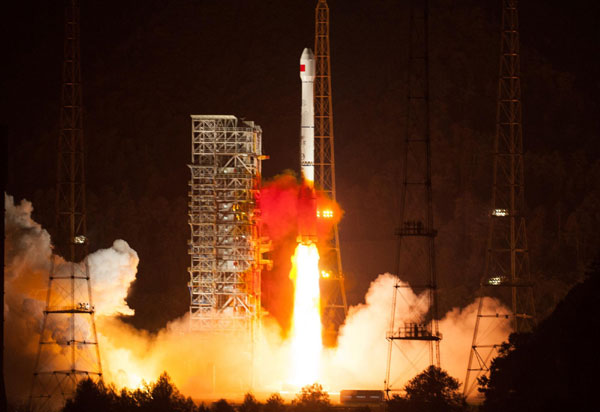Beidou navigation system moves a step closer to global coverage
Updated: 2015-07-27 07:43
By Xinhua(China Daily)
|
||||||||
 |
|
China launched a satellite into space for its indigenous global navigation and positioning network on Oct 25, 2012. [Photo/Xinhua] |
With the launch of two navigation satellites on Saturday, China made another solid step toward building it's own positioning system with global coverage, a leading scientist said on Sunday.
Scientists put two satellites for the Beidou Navigation Satellite System, a domestic alternative to the United States-operated GPS, into orbit on Saturday at midnight.
Xie Jun, chief engineer of the Beidou project, said the two satellites are designed to be trailblazers as the Beidou system expands its coverage globally.
Named after the Chinese term for the Big Dipper constellation, the Beidou project was launched in 1994, some 20 years after the inception of GPS. The first Beidou satellite was launched in 2000.
By 2012, a regional network had taken shape, and the Beidou system was providing positioning, navigation, timing and short-messaging services in China and several other Asian countries.
Beidou is now one of the four dominant navigation systems worldwide, along with GPS, Russia's Glonass and the European Union's Galileo.
The plan is to set up a "constellation" of 35 navigation satellites and expand their coverage to the whole world by 2020. Saturday's launch of the two satellites - the 18th and 19th of the Beidou project and the third this year - and their mission to test navigation signaling and intersatellite links, forms a large part of this plan, Xie said.
"We have deployed a new type of signal format for the two satellites that enables us to double the data exchanged between satellites in a given time," he said. "That means faster and better service for Beidou clients."
Xie said scientists will examine the satellites' distance measurement and anti-jamming capabilities. They will also join the pair with the 17th Beidou satellite, launched in late March, in a mission to test intersatellite connectivity.
The intersatellite links will also allow Beidou satellites to connect with their GPS and Glonass counterparts.
"The edge in compatibility allows Beidou clients to use GPS data for corrections in positioning in order to improve service accuracy and convenience," Xie said.
"Although we started late, Beidou can now almost rival the general performance of any foreign counterparts. We may even have a slight edge in regional enhanced services, positioning reports and short-messaging services," he said. Xie said 98 percent of the components for the satellites launched on Saturday were made domestically.
These include rubidium atomic clocks. Dubbed the "heart" of the navigation satellites, these clocks are work-horses that send synchronized signals so that receivers can triangulate their position on Earth.

 The world in photos: Aug 3-9
The world in photos: Aug 3-9
 'Most beautiful road on water'
'Most beautiful road on water'
 Ethnic groups celebrate the Torch Festival
Ethnic groups celebrate the Torch Festival
 Ten photos you don't wanna miss (Aug 3-9)
Ten photos you don't wanna miss (Aug 3-9)
 30 historic and cultural neighborhoods to visit in China
30 historic and cultural neighborhoods to visit in China
 Beijing Museum of Natural History unveils 'Night at the Museum'
Beijing Museum of Natural History unveils 'Night at the Museum'
 Sun Yang wins third consecutive 800m free gold at worlds
Sun Yang wins third consecutive 800m free gold at worlds
 Aerial escape
Aerial escape
Most Viewed
Editor's Picks

|

|

|

|

|

|
Today's Top News
Govt encourages people to work 4.5 days a week
Officials to pave way for Xi's visit
China, US to exchange officials for Xi's visit
State Council approves plan to overhaul SOEs, claims report
S. Korean president mulls whether to join China's war anniversary
Sun Yang is no-show for 1,500 free final at worlds
China willing to work with US to contribute to world peace, stability
China asks further investigation on MH370
US Weekly

|

|







